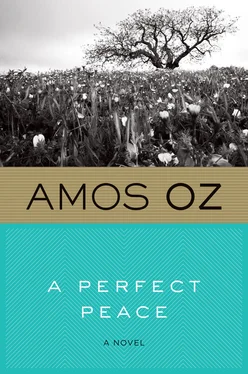Yet on these winter nights winds sometimes swept up the wadis and through the crevices of the mountains until you heard them break into a desperate howl right outside your window, as if they had been driven all the way from the snowy steppes of the Ukraine and still had found no peace. And right before dawn a formation of jets would sometimes shoot with savage furor across the low canopy of sky like a pack of hounds in heat.
In the central bus station of Tel Aviv, Yolek was witness to one of those perennial Jewish scenes that still persist and still wreak havoc. A man with a Hungarian accent who, so it seemed, had been caught in an act of petty theft, began to bellow like an ox being dragged to an altar when he saw a policeman approach.
" Gevalt! " he cried out in Yiddish. "Jews, have pity! Gevalt! "
Dismayed, Yolek bought an evening paper at a newsstand and sat down to read it in a small cafe not far from the station. Headlines announced that a conference of Arab generals meeting in Cairo had arrived at a number of secret decisions. The Prime Minister's speech was reported in a few brief paragraphs. In an adjoining column was a story about a pitched battle among new immigrants in a suburb near Nes Tsiyyona. Yolek could easily imagine it, this fracas of asthmatic, ulcer-ridden, sclerotic refugees, their feeble blows glancing off their antagonists with mounting hysteria.
Elsewhere, in the town of Bet-Lid, two middle-aged men had had to be tied down to be restrained from attacking each other with an ax and a hoe. The hoe-wielder was a baker from Bulgaria and the ax-swinger a goldsmith from Tunis. A settler in the Lachish region had walked out on his family of two wives and nine children, including two sets of twins, left a note that he was going to look for the ten lost tribes of Israel, and disappeared without a trace. A Persian faith healer from the village of Ge'ulim had been indicted for selling amulets to barren women, making them drink a narcotic potion, and, once they were under its influence, committing unspeakable acts.
Yolek thanked the waitress, paid for his coffee, and left. Tel Aviv was not in his opinion an attractive city, yet there was something intrinsically miraculous about it. Great pains had been taken to make day-old streets look historical. There were even green benches here and there that might remind one of Cracow or Lodz. Since his back was bothering him and party meetings never started on time, Yolek decided to sit for a while. A passerby soon recognized him, perhaps from a rally somewhere, or from an old picture in the newspapers in the days when Yolek had served in the cabinet. He wished him a good morning and even sought to strike up a conversation.
"Well now, Comrade Lifshitz, I suppose you find yourself worrying a lot these days."
"Worrying about what?" asked Yolek.
"Oh, things in general. The situation, you might say."
Yolek answered with a question of his own. "And when did we Jews ever have it better?"
On an inner page, Yolek came across a brief item about a man he had known in passing many years ago, an engineer named She'altiel ha-Palti, who had come to Palestine in the early twenties from the small town of Novozhivkov in Russia. This ha-Palti now claimed to have invented a top-secret, giant rocket that would ensure the state of Israel once and for all against any attack. His letters and memoranda on the subject having gone unanswered, however, the old man had irately turned up one day in the offices of the National Land Trust, slightly wounded a young typist with an ancient Italian revolver, and then nearly taken his own life in the mimeograph room in the basement.
We are a mob of the strangest individuals, thought Yolek, who ever pretended to be a people. To speak the same language. Exchanging old songs for new. Forever talking and writing of our hopes and longings as if mere longiloquence could still the promptings of one's inner voice. But why does the weary heart feel so chill?
In the basements of their new houses, these men and women build shelters just in case the bombs should start to fall. The army keeps beefing up its forces. Perhaps there's more than petty politics behind the disinterest in She'altiel ha-Palti's invention. Perhaps his rocket, or something like it, has already been built under wraps. Ben-Gurion always had a soft touch for scientific projects, and Eshkol, too, for the military ones. Who knows what goes on in the back rooms, what wild schemes are discussed by the generals and the savants, even as they are by husbands and wives in their beds at night? How will it all end? What will happen if, God forbid, things take a turn for the worse. Anything is possible. Everything has more than one interpretation. The shouting, the laughter, the curses, the fistfights, the nightmares, the horrid memories, even the war threats coming from Cairo. That's something I should say a few words about, too, when I take the floor. Here is Eshkol promising the nation its dreams are coming true, even if slowly. And there are the wise men of Zion bombarding us in article after article with their historical lessons, their cyclical theories, their grim musings about the common destiny. Is this, then, just an illusion, this winter slumber we're in? Beneath our quilts we are all tossing, turning, debating, wrestling with demons, fighting off legions of nightmares, making all kinds of desperate calculations. What man has never murmured to his wife, "Just in case. You never know. Why not be on the safe side? We have to be prepared for the worst"? And aren't Yonatan and his friends saying to each other: "For as long as we can. Who knows what's ahead"?
On the avenue behind the Habimah Theater, Yolek passed a group of old Jews huddled together on a bench. With their seemingly perpetual display of loathing, despair, and bitter mockery, they might have been drawn by Nazi cartoonists. No doubt worn out by endless argument, they sat in silence, chewing tobacco and staring out into space as if they had read the future there and fatalistically accepted what it foretold.
A religious Jew named Avraham Yitzhak Hacohen Yatom, the owner of a small washing-machine agency, had shut down his business and was now staging a hunger strike in front of city hall. That too Yolek had read in his newspaper. The man was threatening to starve himself to death unless the excommunication of the late philosopher Baruch Spinoza was rescinded. The mayor had sent a clerk down to negotiate, but rain began to fall, and the two men were forced to seek shelter inside.
In settlements along the borders, watchmen stared into the darkness only to see more darkness receding. Sitting on piles of sacks and drinking tea in their tin huts, they would murmur to each other in low voices:
"What quiet! Who would have thought it?"
"Maybe this is it at last."
"Who knows?"
"Anyway, it's quiet now. Let's wait and see."
Opening the party meeting, Prime Minister Eshkol declared, "We, comrades, may well be the craziest adventurers in all Jewish history. Which is precisely why, running as hard as we can, we nonetheless have to run slowly and very, very carefully."
Very, very carefully, thought Yolek Lifshitz. And that's precisely why the heart is so chill and will grow more chill yet, as each of us dies in his own corner without a chance to see the end.
When his turn came at last, Yolek spoke about the close relationship of international and domestic problems. While taking a few wry swipes at today's youth, he reaffirmed his faith in the people's ability to withstand all internal crises. He also stated his faith in their ability to withstand all external crises. What aroused his deepest anxiety was the prospect of being threatened by both at the same time. We must, he said in closing, remain alert and clear-headed. The younger members of the party must be asked to keep in mind the broader historical perspective. Countless centuries of Jewish history, Jewish suffering, Jewish yearnings, and Jewish tears are looking down, are shedding down, upon us.
Читать дальше












